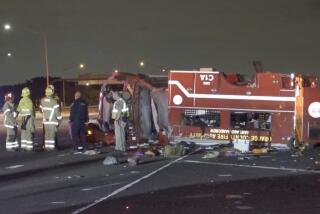Church Case Secrecy May Ease
An appeals court told a judge Friday to reconsider whether to give the public access to the legal fight between the Roman Catholic Church and prosecutors over personnel files of priests suspected of sexual misconduct.
In the unanimous ruling, the 2nd District Court of Appeal in Los Angeles created procedures for the public to seek as much information as possible without violating traditional grand jury secrecy. It was the first time a California court has ruled on the issue.
The case arose when a Los Angeles County grand jury and Dist. Atty. Steve Cooley sought church documents in the ongoing investigation of misconduct by priests.
The church resisted surrendering its files to prosecutors, and most of the debate over what should be disclosed has been conducted behind closed doors.
The decision gives the public, and the media, an unprecedented chance to seek access to traditionally closed grand jury-related proceedings.
“It lets us put our foot in the door and lets us argue that these ancillary issues can be accessible to the public, except to the extent they would shed light on grand jury proceedings,” said Tom Newton, general counsel for the California Newspaper Publishers Assn. “I think it might be a pretty high hurdle ... but the alternative would have been to uphold the blanket secrecy.”
Earlier this year, retired Los Angeles County Superior Court Judge Thomas F. Nuss was hired at $350 an hour to review hundreds of pages of documents that the archdiocese’s lawyers argued should not be disclosed because of various privileges, including those covering communications between priests and penitents.
Nuss sealed all documents and proceedings in the case, citing the need for grand jury secrecy.
The Los Angeles Times and Los Angeles Daily Journal asked the appellate court to make public court papers, transcripts and Nuss’ rulings on whether the archdiocese must turn over documents to prosecutors.
Cooley joined the newspapers’ request.
In the opinion issued Friday, the appellate court said that the case is the first time that a court in California has addressed public access to ancillary grand jury proceedings.
David Kohler, former general counsel for CNN and professor at Southwestern University School of Law, said the appeal represents “a valiant attempt” by media lawyers in an area of the law that historically has been shut tightly behind closed doors.
“Because it’s a grand jury proceeding, it’s an uphill battle,” Kohler said.
Attorney Donald F. Woods Jr., who represents the archdiocese, said he did not expect that Nuss would come to a different conclusion when he hears more arguments in the case, as the appeals court directed.
“Judge Nuss already has stated in writing that he thought the grand jury secrecy would be compromised,” Woods said.
“The ruling is consistent with the historical precedent relating to the grand jury proceedings for centuries,” Woods said. “Grand jury proceedings have been confidential for the obvious reasons: If you are conducting an investigation, you do not tell the people you are pursuing what you are doing. And also a lot of innocent people are brought into grand jury proceedings who are never the targets.”
He said such disclosures could damage a person’s reputation.
“The court of appeal clearly rejected the argument made by the district attorney and the press that the public has access to grand jury proceedings,” said attorney Donald Steier, who represents a number of priests accused of child molestation.
In ordering Nuss to reconsider his August blanket closure order, the appellate court found that proceedings related to grand juries “should be closed and sealed to the extent necessary to prevent disclosure of matters occurring before the grand jury.”
“It is not at all clear the motion to quash litigation can be carried out publicly without disclosing grand jury matters that should remain secret,” Presiding Justice Joan Dempsey Klein wrote for the court. “At the same time, it is at least theoretically possible that some aspect of this privilege litigation can be safely disclosed.”
Klein was joined in her 17-page published opinion by Justices H. Walter Croskey and Patti S. Kitching.
The appellate court found that trial judges, in considering media requests, must not disclose “information that might reveal the nature, scope or direction of the grand jury’s investigation.”
“The decision is important because it held that a trial court cannot issue a blanket sealing order simply because its proceedings are related to the grand jury,” said attorney Kelli L. Sager, who represented the newspapers in the appeal. “We are gratified that the Court of Appeal remanded the matter back to the trial court for ‘individualized’ determination about whether it can release transcripts and pleadings and Judge Nuss’ order without impeding on grand jury matters that are secret.”
Sager’s associate, Susan E. Seager, said some information regarding the grand jury investigation of priests accused of child molestation already has been made public.
The order appointing Nuss to the case, for example, was secret until several weeks ago, when it was filed with other papers with the Court of Appeal in this case.
Cooley said Nuss would have another chance to balance disclosure and secrecy.
“This issue has never before been decided by a California Appellate Court,” Cooley said. “The Court of Appeal returned this matter with a framework for Judge Nuss to determine what can be made public. The court noted there is no place for blanket secrecy. Depending on how Judge Nuss rules, we may revisit these issues with the California Supreme Court.”
*
Times staff writer Richard Winton contributed to this report.
More to Read
Sign up for Essential California
The most important California stories and recommendations in your inbox every morning.
You may occasionally receive promotional content from the Los Angeles Times.










